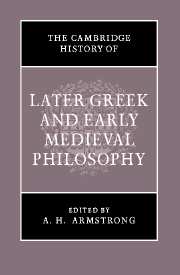Book contents
- Frontmatter
- Chapter 1 Introductory
- Part 1 GREEK PHILOSOPHY FROM PLATO TO PLOTINUS
- Part II PHILO AND THE BEGINNINGS OF CHRISTIAN THOUGHT
- Part III PLOTINUS
- Part IV THE LATER NEOPLATONISTS
- Part V MARIUS VICTORINUS AND AUGUSTINE
- Chapter 20 Marius Victorinus
- Chapter 21 Augustine. Biographical introduction: Christianity and philosophy
- Chapter 22 Augustine. Man: body and soul
- Chapter 23 Augustine. Reason and illumination
- Chapter 24 Augustine. Sense and imagination
- Chapter 25 Augustine. Human action: will and virtue
- Chapter 26 Augustine. God and nature
- Chapter 27 Augustine. Man in history and society
- Part VI THE GREEK CHRISTIAN PLATONIST TRADITION FROM THE CAPPADOCIANS TO MAXIMUS AND ERIUGENA
- Part VII WESTERN CHRISTIAN THOUGHT FROM BOETHIUS TO ANSELM
- Part VIII EARLY ISLAMIC PHILOSOPHY
- Select Bibliography
- Additional Notes and Bibliography
- Index of ancient and medieval works referred to in the text
- General Index
- Index of Greek terms
- References
Chapter 25 - Augustine. Human action: will and virtue
from Part V - MARIUS VICTORINUS AND AUGUSTINE
Published online by Cambridge University Press: 28 March 2008
- Frontmatter
- Chapter 1 Introductory
- Part 1 GREEK PHILOSOPHY FROM PLATO TO PLOTINUS
- Part II PHILO AND THE BEGINNINGS OF CHRISTIAN THOUGHT
- Part III PLOTINUS
- Part IV THE LATER NEOPLATONISTS
- Part V MARIUS VICTORINUS AND AUGUSTINE
- Chapter 20 Marius Victorinus
- Chapter 21 Augustine. Biographical introduction: Christianity and philosophy
- Chapter 22 Augustine. Man: body and soul
- Chapter 23 Augustine. Reason and illumination
- Chapter 24 Augustine. Sense and imagination
- Chapter 25 Augustine. Human action: will and virtue
- Chapter 26 Augustine. God and nature
- Chapter 27 Augustine. Man in history and society
- Part VI THE GREEK CHRISTIAN PLATONIST TRADITION FROM THE CAPPADOCIANS TO MAXIMUS AND ERIUGENA
- Part VII WESTERN CHRISTIAN THOUGHT FROM BOETHIUS TO ANSELM
- Part VIII EARLY ISLAMIC PHILOSOPHY
- Select Bibliography
- Additional Notes and Bibliography
- Index of ancient and medieval works referred to in the text
- General Index
- Index of Greek terms
- References
Summary
The sources of Augustine's reflection on human conduct, as of much of his thought, are the teaching of the Scriptures and the Church, and of Greek, particularly of Neoplatonic, philosophy. Sometimes, as we have noted, these two are in tension; in the present case, however, they blend completely in his mind. Indeed, it was here that he was above all impressed with the convergence he detected between Platonic and Christian teaching. His readiness to adopt other aspects of Platonic modes of thought, for instance in his discussion of soul and body, can in part be accounted for by this conviction of the similarity of their ethical bearings to those of Christian teaching. Tensions which can sometimes be detected between his Christian belief and his adopted philosophical concepts and language, tensions of the kind we have encountered, for instance, in his account of man as a soul using a body, are here totally absent.
Blessedness, as we have seen, was, for Augustine, the aim of philosophy. The wisdom which philosophy strove to attain would fill and satisfy all the deepest human needs and longings. Augustine was very ready to read back into Plato his own interpretation of what this love of wisdom consists in: Plato, he says, identified the supreme good, in the enjoyment of which man finds blessedness, with God. “And therefore he [Plato] thought that to be a philosopher is to be a lover of God.’ Affirmations of this kind pave the way for an almost wholesale adoption of Platonic notions, especially in the sphere of ethics.
- Type
- Chapter
- Information
- Publisher: Cambridge University PressPrint publication year: 1967



